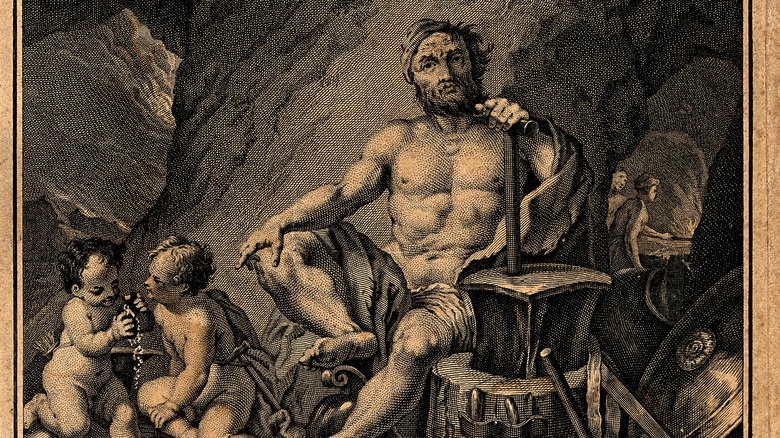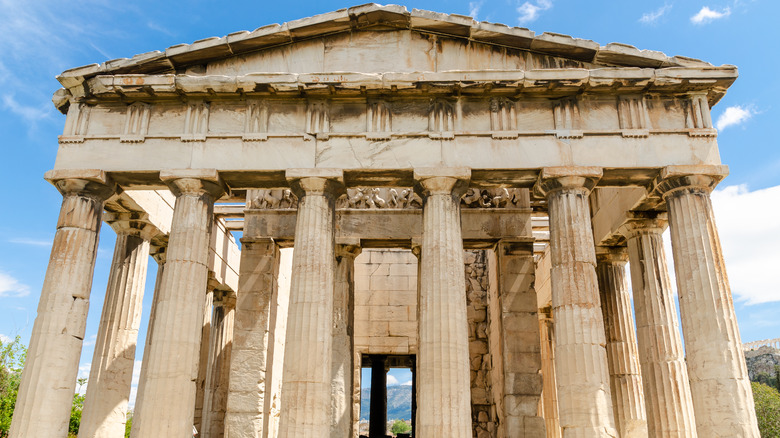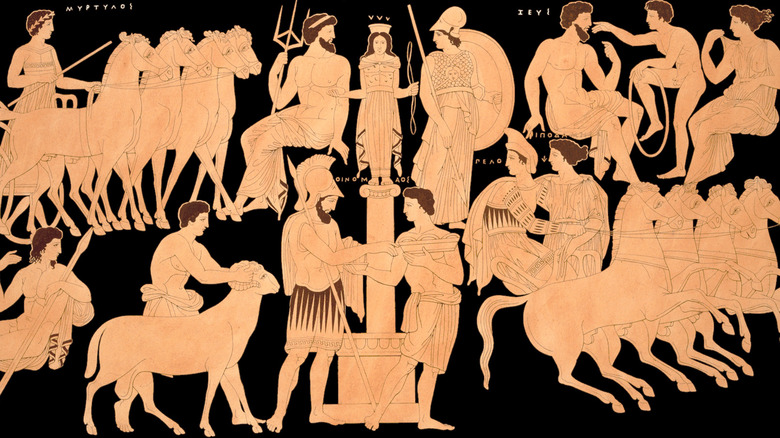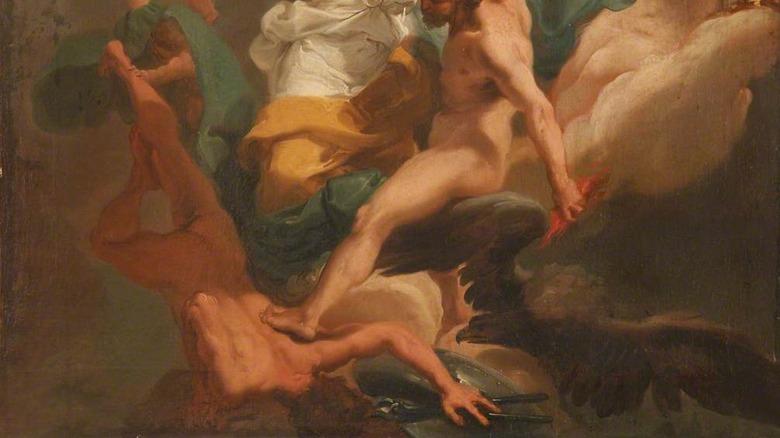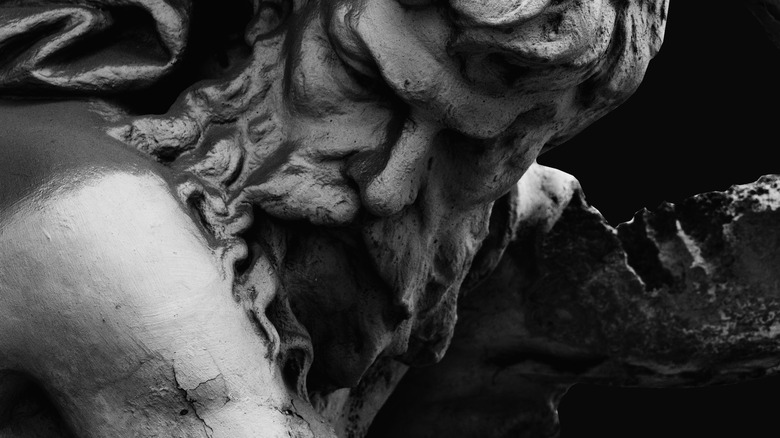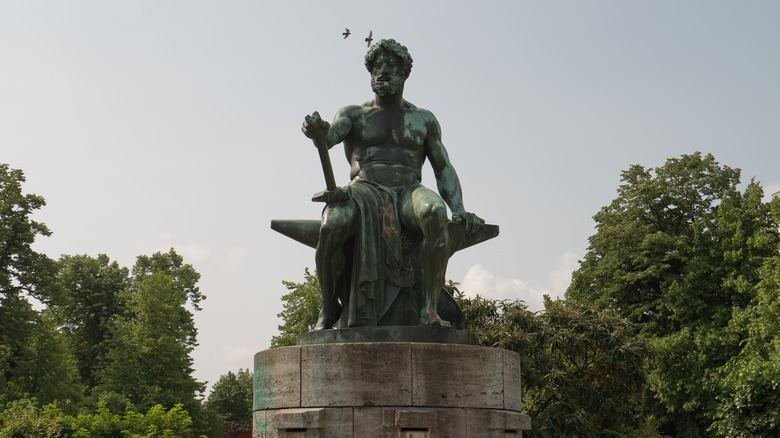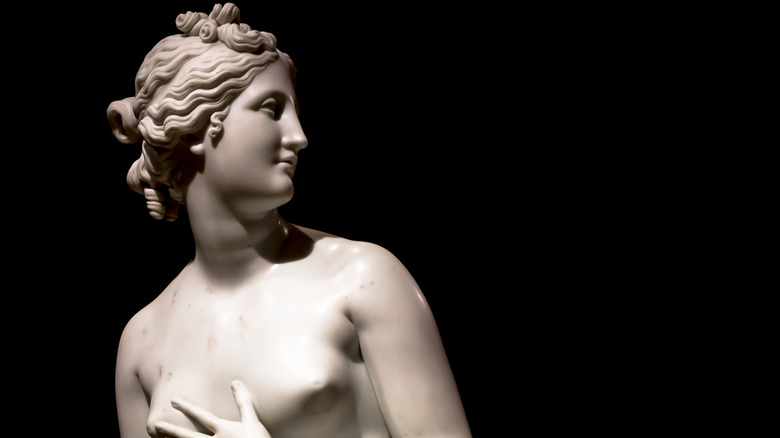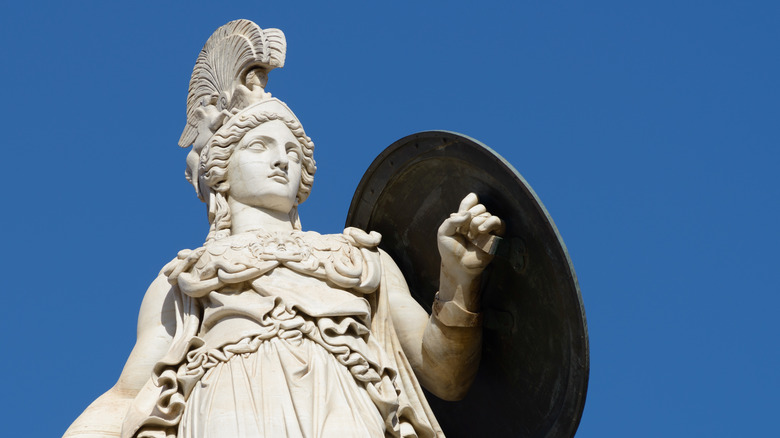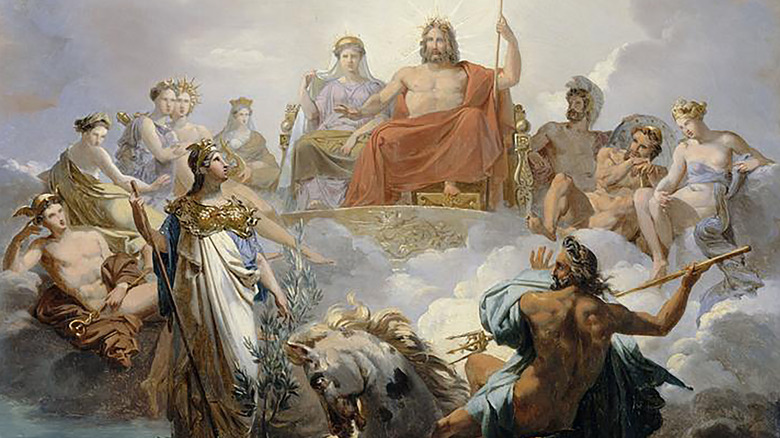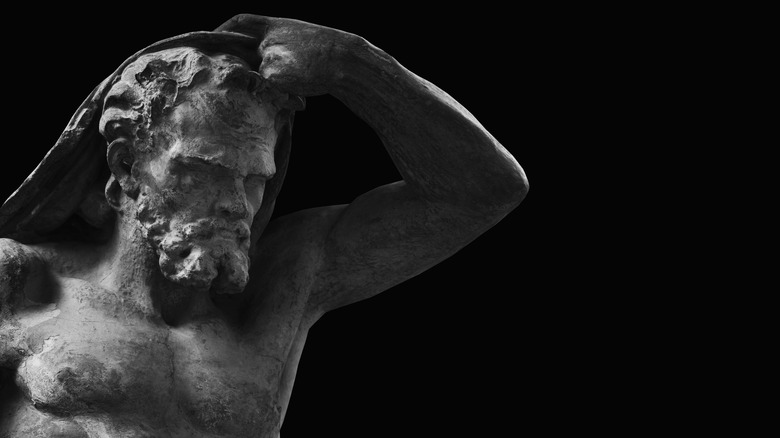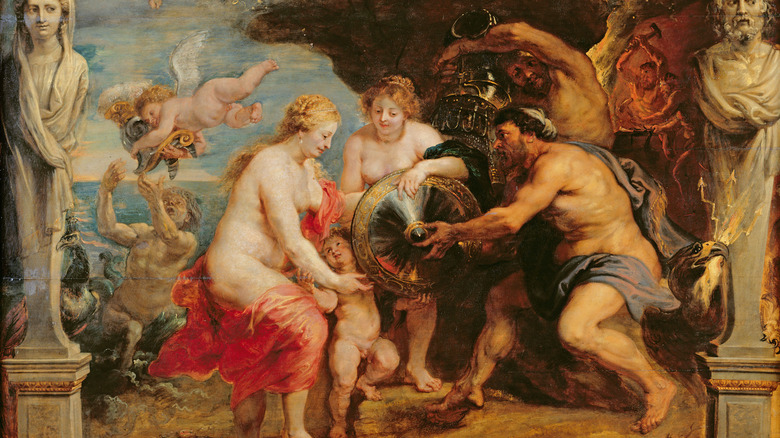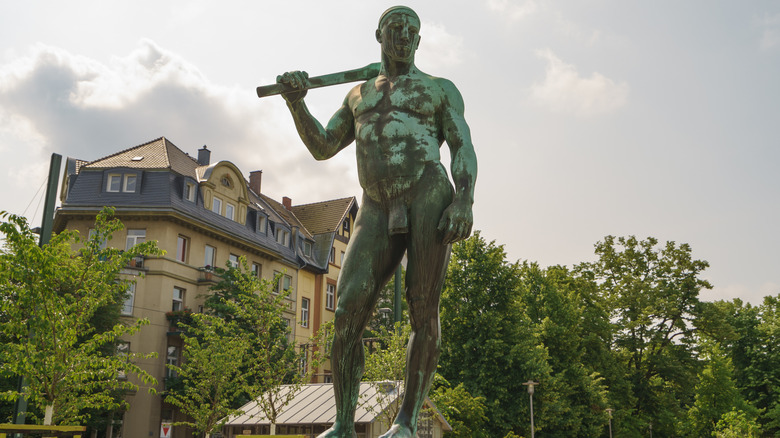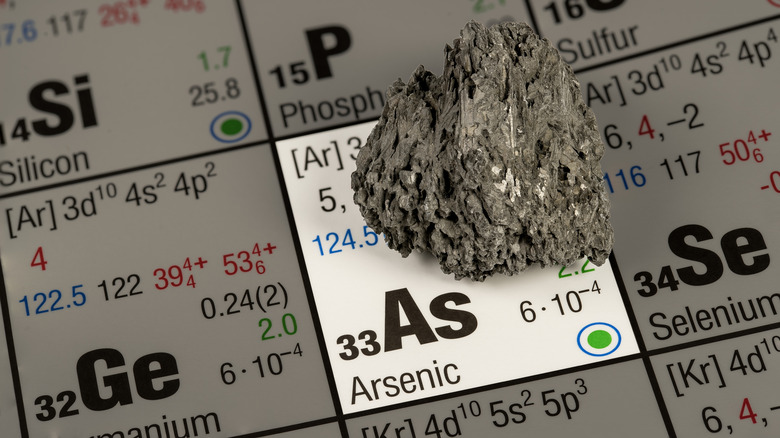The Mythology Of Hephaestus Explained
God of fire, of craft, of volcanoes, and perhaps most importantly, of the forge, Hephaestus is the go-to guy of Greek mythology when you need weapons, maybe a palace, or just some fancy bling.
His story, though, shows just how shallow his fellow gods could be; Hephaestus was cast off Mount Olympus purely because he wasn't pretty. The son of Hera, and born lame, Hephaestus was raised not in the halls of the immortals, but on an Aegean island by his foster mothers Thetis and Eurynome (yes, Hephaestus had two mommies). Discovering fire, he soon became a master blacksmith and dazzled the mortal world with his work. In fact, when Thetis appeared at a party on Olympus decked out in jewels made by Hephaestus, Hera was so in awe that she demanded to know where such sparklers could be had. Thetis told the Queen of the Gods about Hephaestus, leaving Hera to seriously question herself about her parenting skills.
But if you think this a story about mommy issues taken to an Olympic level, think again. Hephaestus, known to Romans as Vulcan, is an unexpectedly complex and unnervingly relatable god. He's not perfect, famously so, but he has a fantastic tale to tell.
Hephaestus is old
Worship of Hephaestus goes deep into history. In fact, researchers theorize he is the "A-pa-i-ti-jo" of Mycenaean Greece. If Mycenaean Greece is a new term, think of it as the ancient Greece of ancient Greece. Running from 1300 to 1000 B.C, via History.com, Mycenaean Greece is the foundation for the much more famous Classical Greece, a period spanning 480 to 323 B.C., and when all the "THIS! IS! SPARTA!" drama happened.
This means Hephaestus is one of the oldest attested Olympian gods. He predates his wife, Aphrodite — as an import from Phoenicia (via MythologySource), she didn't show up as a Greek goddess until approximately the 8th century B.C. And at least one source recounts Hephaestus creating a golden dog to guard Zeus as a baby. This throws the canonical timeline of Hephaestus off, since Zeus is considered the father of Hephaestus (or at least older than him), and Hera, mother to the fire god, was inside Cronus when Zeus was a child.
Why the confusion? Between the Mycenaean and Classical eras is a 300-year dark age: the Bronze Age Collapse. All the civilizations of the eastern Mediterranean mysteriousy trainwrecked. Egypt rebuilt, but others, like the Hittites, crashed so badly that most evidence of their civilization was lost until the 19th century. Greece did a hard reset, and the gods reshuffled from their Mycenaean originals into the roles Homer and Hesiod later recorded. But several stray myths lived on.
Hephaestus has at least two strange birth stories
Gods can have some strange births: Athena was cracked directly out of the skull of Zeus fully grown; Horus was conceived after his father's death (ew) and dismemberment (really ew); Padmasambhava, a semi-divine figure in Buddhism, was born from a lotus flower. Hephaestus is no different, but for very different reasons.
Hephaestus has at least two birth stories. Homer, author of "The Iliad" and "The Odyssey," states that the smith god was born of a union between Zeus and his wife, Hera. For Greek gods, this is an astonishing standout; as cynical as it sounds, it would mean that unlike Apollo, Artemis, Hermes, Dionysus, and Aphrodite, Hephaestus is, along with Ares and Athena, the only next-gen Olympian to actually be born within wedlock (Athena was the daughter of Zeus and his first wife, Metis).
But this isn't the only tale about Hephaestus' conception. Hesiod, a near-contemporary of Homer, contends in his "Theogony" that Hephaestus was a result of parthenogenesis. Hera, jealous that Zeus was able to birth Athena, conceived Hephaestus with no contribution from her husband.
As an FYI, it's not uncommon for Olympians to have slightly differing myths. Each individual city-state in ancient Greece had its own specific takes on a particular god. For example, Hephaestus' wife, Aphrodite, was purely a love goddess in Athens, but also a war goddess in Sparta.
Hephaestus was kicked out of Olympus twice
Don't hate Zeus because he rape-shamed Hera into marrying him and then cheated on her up and down the mythos! Don't hate Hera because she loved the power of being Queen of Olympus so much she killed Dionysus to keep it, and is a slut-shamer to boot! Hate them both equally because they abused their own child so badly he was permanently maimed, and then laughed at him for it!
Hephaestus' famous lameness is either the result of Hera, via Hesiod, noticing he had a malformed foot and threw (not banished, THREW) him from Olympus in disdain, or because Zeus, via Homer, backhanded him off the sacred mountain for trying to protect Hera from Zeus in a fight. Some sources (per Britannica) say that each event happened sequentially and Hephaestus was knocked out of Olympus twice.
Regardless of who kicked the smith god out of Olympus, the poor guy managed to faceplant on every branch of the ugly tree on his fall to Earth before impacting so hard that he would never be beautiful. And in total compliance with the idea that gods rarely, if ever, take responsibility for their actions, neither Hera nor Zeus did anything to heal Hephaestus' wounds. They left him crippled.
Hephaestus got sweet, sweet revenge
For much of his early life, Hephaestus had no love for Olympus, particularly Hera. When he had the chance to give as good as he got, he did.
Hephaestus never forgave Hera for using him for throwing practice, so he created a gorgeous throne and sent it anonymously to the Queen of Olympus. Stumped by her secret Santa, Hera sat down on the mysterious gift. What happened next depends on the author; Pausinias says Hera was bound by invisible fetters, while Pseudo-Hyginus relates that she was hung in the air. Either way, she was stuck for three days.
Hephaestus didn't just take his revenge on Hera. Enraged at Aphrodite's infidelity with Ares, he forged a gossamer-thin net that actually weighed the Olympian equivalent of several tons, pinning the lovers in flagrante delicto. He then called all the gods to come laugh at the pair (if this sounds like a relatively mild punishment, in his play "Medea," Euripides explains that mocking laughter was one of the worst insults of the ancient Greek world).
Proving that he could be as vicious as any on Olympus, Hephaestus also gave Harmonia, the bastard daughter of Aphrodite and Ares, a necklace that brought serious misfortune to its wearer. GreekMythology.com lists not only Harmonia, but Jocasta, Seleme, Eriphyle, and Phyallus as victims of the necklace.
Hephaestus is a lot stronger than he looks
When the Olympians finally figured out it was Hephaestus who trapped Hera, they also came to the socially awkward conclusion that only Hephaestus could free her and that he had to come back to Olympus to do it. So who did they send down with the proverbial olive branch? A kindly matron-figure like Hestia? Nope! The no-nonsense Artemis? Negative! The level-headed Athena? She hadn't been born yet! Clearly showing Olympus was still trying to boss Hephaestus around, the gods sent Ares. Generally speaking, the god of war isn't big on olive branches, and Ares had his militaristic buttocks handed to him when Hephaestus set the war god on fire (via MythologySource).
Hephaestus is also one very strong god; "Antoninus Liberalis" relates how Hephaestus/Vulcan was strong enough, in fact, to stand as guard over the world-destroying giant Typhon (via Theoi). He is a blacksmith, after all. Ares was chump change.
Panicked, humbled, and carbonized, the Olympians resorted to their ultimate playing card: they got Hephaestus drunk. Yes, Zeus and company (as described in Ancient World Magazine) instructed Dionysus to get the smith god tipsy enough that he could be hefted onto the back of a mule and hauled back to Olympus to free Hera.
And free her Hephaestus did — with one very big (and perhaps not well thought out) stipulation concerning the matter of the fire god's marital status ...
Hephaestus is the ultimate wronged husband
As wife material, Hephaestus was well aware that Aphrodite was the goddess of love, sex, and beauty, but had no idea she was also the goddess of all-consuming black holes of emotional insecurity. This is the same goddess that set off the Trojan war to win a beauty contest, ordered Pysche, her future daughter-in-law, to literally go to hell for the sole purpose of making her even more pretty, and killed Hippolytus because he was asexual. Yikes.
At the same time, Aphrodite wasn't an idiot; she knew she was a pawn in the Hephaestus-Hera drama and was not about to go quietly into an arranged marriage she didn't want. And she let everybody know it: Anchises, Adonis, Boutes, Dionysus, Hermes, Phaethon, Poseidon and, most famously, Ares were all her extramarital lovers.
For his part, Hephaestus was painfully aware he wasn't beautiful and so tried to earn Aphrodite's heart by making her all sorts of beautiful things, including the famous girdle that made her even more desirable (via Theoi). While she took every bauble he made, Aphrodite was never won over; not only did Hephaestus and Aphrodite not have children (via Mythopedia), "The Odyssey" says that the smith god offered to give Aphrodite her single-lady freedom provided he got her dowry returned.
However, Hephaestus was no incel. Homer relates that he later married Aglaia (also called Charis) and fathered many children.
Hephaestus (maybe) tried to rape Athena
Hephaestus has a curious relationship with Athena. From a thematic standpoint, a pairing of Hephaestus and Athena based on their responsibilities alone makes sense, something not lost on the Greeks. As Mythopedia points out, both deities are patrons of craftsmen and women, with Athena considered white-collar and Hephaestus more of the working-man type. Unfortunately for Hephaestus, Athena is, along with Artemis and Hestia, one of the three sworn virgins of Olympus. So of course this wasn't going to end well.
There are two myths involving Hephaestus and Athena, with the added bonus of the Athenian royal line. The first, via GreekMythology, describes how Hephaestus tried to rape Athena outright but she eluded him. Hephaestus still ejaculated, and his seed fell upon the ground and, indirectly, impregnated the primordial Earth goddess Gaia. This resulted in the conception and birth of Erichthonius, an early king of Athens who was, ironically, raised by Athena and who was later turned into the constellation Auriga.
The second myth, from Pseudo-Apollodorus, involved Hephaestus demanding the hand of Athena because he was, technically, the one who "midwifed" her out of Zeus' skull. Zeus agreed, but Athena was reluctant. She managed to make it all the way to the marital bed, but just before Hephaestus was to consummate their marriage, she bolted. Hephaestus ejaculated on Earth, again conceiving Erichthonius.
Hephaestus is highly specialized as a god
You may have the idea that all 12 Olympians were given equal due, but that isn't really so. While the Greek, and later Roman, worlds were keen to stay on the gods' good side, the reach of some deities was restricted.
As the god of fire, smiths, and craftsmen, the earthly sect of Hephaestus began and ended at the door of the smithy or workshop; poets or sailors would have no reason to worship a god of the forge. That being said, the entire Aegean island of Lemnos, the spot on Earth where Hephaestus crash landed, was considered so sacred to the god that its ancient capital was named Hephaestia in his honor. According to Herodotus in "The Histories," Lemnos was originally the domain of the Pelasgians, a sort of catch-all ethnonym for the pre-Greek population of the region, hinting at just how old Hephaestus/"A-pa-i-ti-jo" is.
There seems to be only two gods that every Greek worshipped. The first was Zeus, whose epithet Panhellenios ("of all the Greeks") gives a good hint of his popularity as King of the Gods. The second, ironically enough, was Hephaestus' wife, Aphrodite. WorldHistory.org notes that far beyond her worship among the Greek populace, Aphrodite was also the official state goddess of several cities. Her appeal high and low is reflected in her form of "Aphrodite Pandemos," literally "Aphrodite of all the people."
Hephaestus is the only physically flawed Olympian
However horrible the Olympians were in their actions, they, as physical paragons, made it look great. Except for Hephaestus.
Because of his iconic lameness, the floodgates were unleashed on the guy for every ugly aspect one can have, which has only been amplified through the years. A 1742 statue of the god by Guillaume Coustou the Younger shows the smith with a bug-eyed, inhuman face. More recently, in Disney's "Hercules," Hephaestus is depicted as a short, balding potato of a man. This flies in the face of his being one of the younger Olympians, as well as the previous hot-daddy glow-up he (as Vulcan) and the loincloth he isn't wearing got in "Fantasia." The "God of War" computer game shows him as decrepit and half-blind, and DC's "Justice League Unlimited" throws in not only baldness, but a hunched back, missing tooth, and bad hygiene.
In classical literature, it is only said that Hephaestus is "lame" or "halting." While he clearly had a deformity of the legs, the rest of his appearance is up to question. A statue of Hephaestus was recovered at Ostia Antica, and it's actually something of a pop-culture disappointment. While the figure indeed leans to one side, the rest of the man is perfectly "normal."
Hephaestus made many important things
Like Aphrodite, the other Olympians may not have particularly liked Hephaestus, but they certainly liked the things he made. In fact, the Greek gods could not have reached their positions of power without Hephaestus. In several myths where the gods engage in battle, from the Titanomachy to the Aloadae, many of the weapons used were made by Hephaestus. In the Greek mythos, if there is a weapon or item particularly fabulous or fantastical, there is a good chance Hephaestus made it.
Whether at his anvils on Olympus or at his summer home under the volcano of Mount Etna in Sicily, the Greek god of the forge made use of his time. He crafted automatons (think robots) to help him move around, the thunderbolts of Zeus (as well as his the scepter and aegis) the winged helmet of Hermes, and the chariot used by Helios and Apollo (via Mythopedia.com). He made the rattle Herakles used to spook the Stymphalian birds, the bow of the love god Eros, the arrows of Apollo and Artemis, plus all the (non-trappy) thrones of the Olympians, and even their individual palaces. The god was a prodigy.
And it wasn't just gods that Hephaestus equipped. Homer records the scepter of authority used by not-father-of-the-year Agamemnon is certified Hephaestus-made, as is the cuirass of Diomedes. He was also the creator of Talos, a bronze giant that guarded Crete. This was a god who helped.
Hephaestus is one of the nicest Olympians
Maybe it was because he knew what it was like to be the one to be laughed at by the beautiful people. Maybe it was because, as a god of craftsmanship, it was in his nature to be helpful to his worshippers. Maybe it was because he was the only Olympian to engage in extremely taxing manual labor. But whatever the reason was, as Greek gods go, Hephaestus is easily one of the nicest. If there is an altruistic peacemaker on Olympus, it is the god of fire.
He clearly has a soft-spot for the disabled: When a blinded Orion stumbled into his forge, Hephaestus lent the giant his servant Cedalion to act as a guide in finding the restorative light of the sun god Helios. Hephaestus also reconstituted the shoulder of Pelops after Demeter ate it (long story), and employed the monstrous-looking Cyclopes in his forge.
Interestingly, Hephaestus, while officially siding with the Greeks in the Trojan War, was worshiped by both sides and so aided both. He made the set of armor and shield for his foster-brother Achilles, and also saved the Greek hero from the river god Skamandros. But the smith god also saved the Trojan warrior Idaios from death.
This said, he's not exactly your BFF on Olympus. Aside from his lust for Athena, Hephaestus was the one who forged Pandora, the archetypal sleeper agent of humanity's doom.
Hephaestus is not the only lame smith god
Curiously, the image of a lame smith god is very common. Aside from Hephaestus/Vulcan, there was Wayland the Smith of the Germanic-speaking people. In Egypt, the creator-craftsmen god Ptah was described as a dwarf (not particularly disabled, but still "othered"). This has led several researchers to theorize that their disability is in fact a mythologised real-world danger associated with Bronze Age metallurgy: arsenicosis.
According to a study from the National Center for Biotechnology Information, ancient forgemasters would, in times when tin wasn't available, substitute it with arsenic in the production of bronze. Blacksmithing is obviously dangerous and always has been, what with flames, shooting sparks, and molten metal, but Bronze Age smiths made it worse by unknowingly using substances that were toxic, particularly if vaporized into the air through an open forge and inhaled.
Arsenic is poisonous, and can cause nerve damage that can result in weakness, numbness, and pain, among other symptoms. Chronic exposure to arsenic can also result in a variety of cancers, particularly of the skin. With this in mind, mythologists infer that ancient smiths probably had a host of unique physical maladies and disfigurements that would eventually be associated with smithing gods like Hephaestus and Wayland, even long after bronze was phased out in favor of iron.
